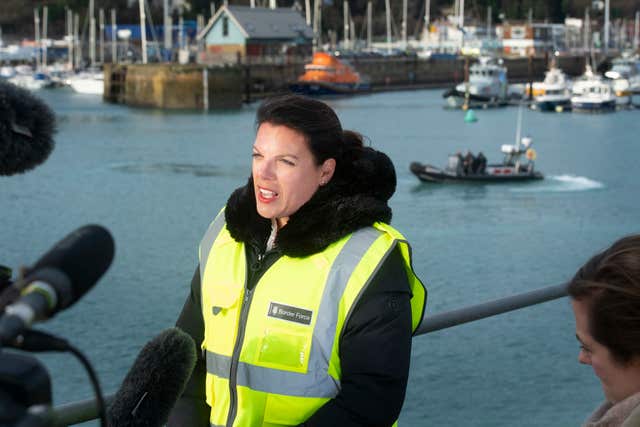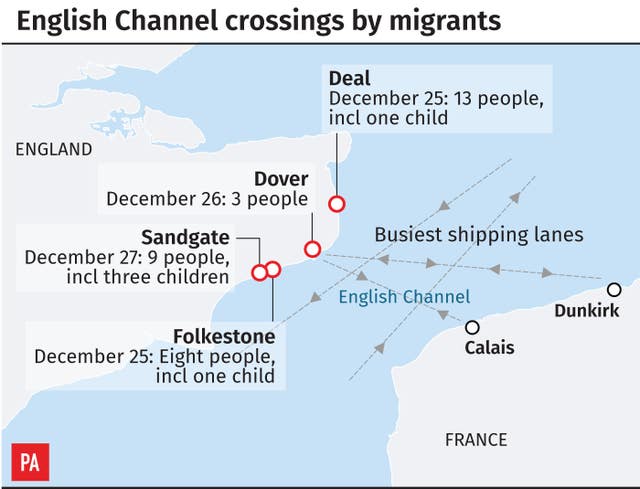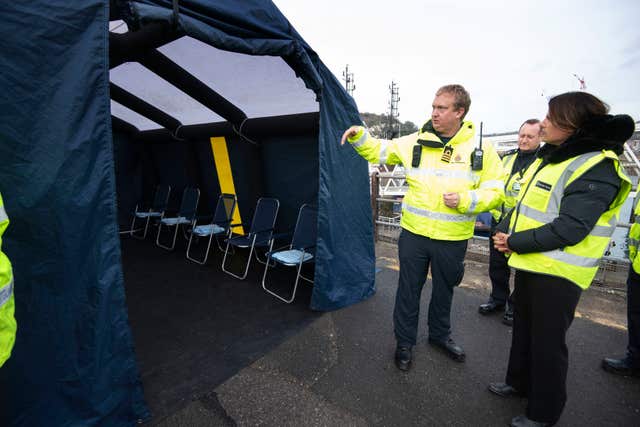
Home Secretary Sajid Javid has promised to do more to stop small boats carrying migrants across the English Channel, after cutting short his Christmas break to deal with what he described as a “major incident”.
Mr Javid took the decision to return to the UK amid calls from MPs for the Royal Navy to be sent in or for Border Force cutters to be brought back from the Mediterranean to intercept traffickers’ dinghies.
He said he was keeping the number of Border Force vessels in the Channel “under close review”, but admitted there was “no one easy answer” to a situation which has seen dozens of attempts to make the perilous crossing from France.
Defence Secretary Gavin Williamson said the armed forces were ready to offer help if needed, telling the Sunday Telegraph: “We have not had any requests as yet but if the Home Office is in need of armed forces support then our Navy, Air Force and Army stand ready to assist.”
In the latest of the wave of attempted crossings, two boats carrying 12 men from Syria and Iran were brought to shore at Dover on Friday. Another 40 migrants were detected on Christmas Day.
And the head of the National Crime Agency-led Invigor organised immigration crime task force, Chris Hogben, warned more crossings were “likely” in the coming weeks.
Mr Hogben said that “significant resources” were being devoted to helping French authorities disrupt trafficking activities, which were carried out by “organised criminals with a complete lack of regard for human life”.
“As a result of that co-operation, dozens of attempted crossings have already been prevented and only last week three suspected facilitators were arrested and charged in France,” he said. “They will face trial in the new year.
“Over the last three weeks, our French colleagues have disrupted numerous attempts, recovering at least 95 migrants including nine children, and arrested seven people caught attempting to facilitate these crossings.
“Working with our French partners, we would anticipate further arrests over the coming weeks and also more attempts to reach the UK are likely.”
On Friday, Mr Javid declared the situation a “major incident”, appointing a “gold commander” to oversee the situation and give daily updates.

He said on Saturday: “The situation in the Channel is of grave concern, with people gambling their lives in reckless attempts to reach the UK in unsafe boats and treacherous conditions.
“It is vital we strike a balance between protecting them and protecting our borders, ensuring we do not encourage more people to make this dangerous journey.”
Mr Javid said the Home Office had been working closely with the French “for some time” on the issue, and actions had been stepped up over the Christmas period after a rise in activity.
“I continue to keep the number of Border Force cutters in the Channel under close review, but there is no one easy answer to this complex problem,” he said.
“That is why I will continue to work closely with all partners to ensure we do even more to intercept these boats before they reach the UK, to tackle the organised crime gangs that facilitate many of these dangerous journeys, and to deter and protect those driven to make them.”

Mr Javid is coming under increasing pressure to provide more resources for operations in the Channel.
A spokeswoman for the Immigration Services Union (ISU), which represents Border Force staff, said the two ageing cutters available for patrols were “woefully inadequate”.
And Dover MP Charlie Elphicke called for cutters to be brought back from the Mediterranean, where they are taking part in search-and-rescue operations.
He dismissed suggestions that patrol boats might act as a magnet for migrants hoping to be picked up and brought to the UK, telling the Press Association he did not accept they would be “anything other than a deterrent”.
“Everyone knows that the rescues are being done by the RNLI, who are volunteers and going out over the Christmas period making sure people are not at harm on the high seas,” said Mr Elphicke.
John Woodcock, a member of the House Commons Home Affairs Committee, told The Sun: “The public is losing confidence in the struggling Border Force. It’s time to stop the rot by sending in the Royal Navy.
“If the civilian force can’t cope, the Navy must stop this crisis becoming a catastrophe.”
Visiting Dover to speak with Border Force officials, immigration minister Caroline Nokes rejected suggestions that not enough was being done, saying there was an “enormous intelligence-led operation to make sure that arrests are made in France”.
She added: “Where people’s lives are at risk, people are rescued where necessary.”
Ms Nokes responded cautiously to calls for more patrol vessels, warning: “It is feasible that were we to put additional craft (out) they might act as a magnet – encouraging people to make a perilous crossing.”
ISU spokeswoman Lucy Moreton said it was “very difficult to know” how much the French authorities were doing to prevent people-smuggling from the camps housing migrants around Calais.
“We are being told that those touting for these crossings are absolutely open about it,” she told BBC Radio 4’s Today programme. “They are around and about in the camps, they are in the cafes in those areas of Calais. They are very clear, very open, touting for crossings that night.
“If it’s that obvious to journalists and staff in those areas, then presumably it is obvious to the French authorities too.”

A spokeswoman for the French Maritime Prefecture, Ingrid Parrot, said the number of illicit crossings in small boats had increased from 23 in 2016 and 13 in 2017 to 70 this year, the majority of them after the end of October.
Ms Parrot told Today: “Before 2018, we didn’t have smugglers. But now we have smugglers on the French coast and it is really a network.
“Before that it was not a network, it was individual migrants who were trying to cross. Now it’s a network, a criminal organisation.”
Ms Parrot said smugglers are using the prospect of Brexit as a way to try to encourage migrants to attempt the perilous crossing before the impending change in UK relations with the EU.


Comments: Our rules
We want our comments to be a lively and valuable part of our community - a place where readers can debate and engage with the most important local issues. The ability to comment on our stories is a privilege, not a right, however, and that privilege may be withdrawn if it is abused or misused.
Please report any comments that break our rules.
Read the rules here